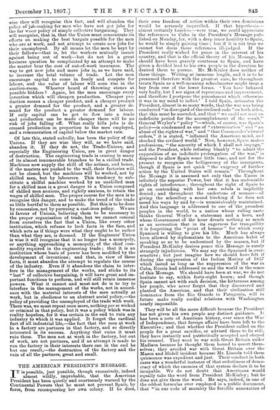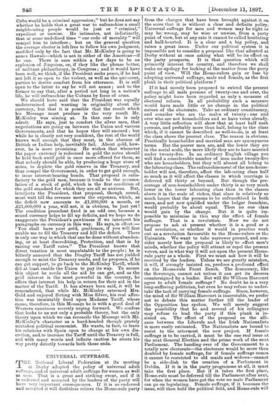THE AMERICAN PRESIDENT'S MESSAGE.
IT is possible, just possible, though excessively, indeed almost wildly, improbable, that the American President has been quietly and courteously warned by the Continental Powers that he must not prevent Spain, by force, from reconquering her own colony. If he does, their own freedom of action within their own dominions would be seriously imperilled. If that hypothesis— almost certainly baseless—were true, we could appreciate the references to Cuba in the President's Message pub- lished on Monday, for, with a deep inner hostility to Spain, he would be simply gaining time ; but if it is not true we cannot but deem those references ill-judged. If the President really wished for peace in the interest of his country, and that is the official theory of his Message, he should have been gravely courteous to Spain, and have given a decided lead to his own people in the direction he desired them to pursue. Mr. McKinley does neither of these things. Writing at immense length, and it is to be presumed therefore with the greatest care, he throughout treats Spain as a well-meaning schoolmaster might treat a boy from one of the lower forms. You have behaved very badly, but I see signs of repentance and improvement„ and therefore I postpone the punishment which otherwise it was in my mind to inflict.' I told Spain, intimates the President, almost in so many words, that the war was being conducted "in disregard of the civilised code "on both sides, that this must be amended, and that " we could not wait an indefinite period for the accomplishment of the result." General Weyler's " policy "—which, of course, was Spain's policy—is condemned as one of " extermination " and "an abuse of the rights of war," and " that Commander's brutal orders," it is stated, " inflamed the American mind, and shocked the civilised world." Now, however, Spain makes professions, "the sincerity of which I shall not impugn," and the President, while refusing blankly " to admit the supposition of an indefinite prolongation of the war," is disposed to allow Spain some little time, and not for the present to recognise the belligerency of the insurgents, though if Spain is not quick " the exigency of further action by the United States will remain." Throughout the Message it is assumed not only that the Union is infinitely the superior Power, but that it has undeniable rights of interference ; throughout the right of Spain to go on contending with her own rebels is implicitly denied ; and throughout the undertone of menace—of giving the schoolboy a sound birching if he does not mend his ways by and by—is unmistakeably maintained. And this language is addressed to one of the proudest peoples in the world, to a nation whose ruling caste thinks General Weyler a statesman and a hero, and whose Government of the hour dreads nothing so much as an accusation that in its eagerness for tranquillity it is forgetting the "point of honour" for which every Spaniard is willing to give his life. Much has always been allowed by diplomatists to the American habit of speaking so as to be understood by the masses, but if President McKinley desires peace this Message is surely strangely injudicious. We may say the Spaniard is over- sensitive ; but just imagine how we should have felt it during the suppression of the Indian Mutiny of l857 which lasted as long as the suppression of the war in Cuba, Russia had addressed us and the world in the sense of this Message. We should have been at war, we do not hesitate to say, within forty-eight hours ; and though Spain cannot act with such decision, the bitterness among her people, who never forget that they discovered and planted the Americas. and that their civilisation still dominates from the Rio Grande to Patagonia, will in future make really cordial relations with Washington nearly impossible.
They will be all the more difficult because the President has not given his own people any distinct guidance. It has been a note of American history, ever since the War of Independence, that foreign affairs have been left to the Executive ; and that whether the President called on the people for a great sacrifice, or advised them to lie still, they have instantly and patriotically accepted and obeyed his counsel. They went to war with Great Britain under Madison because he thought them bound to assert them- selves ; they avoided war with Great Britain over the Mason and Slidell incident because Mr. Lincoln told them quiescence was expedient and just. Their conduct in both cases was a wonderful instance of that orderliness of demo- cracy of which the enemies of that system declare it to be incapable. We do not doubt that Americans would equally take the word from President McKinley ; but he does not give them the word. He says, indeed, in one of the oddest formulas ever employed in a public document, that " in our code of morality the forcible annexation of Cuba would be a criminal aggression;" but he does not say whether he holds that a great war to enfranchise a small neighbouring people would be just or " criminal," expedient or unwise. He intimates, not indistinctly, that at some undefined time " our code of morality" will compel him to interfere ' • but on the general question the average elector is left free to follow his own judgment, modified only by the fact that Mr. McKinley is going to annex Hawaii—which is not in either of the Americas—if he can. There is sure within a few days to be an explosion of Jingoism, or, if they like the phrase better, of militant philanthropy, in Congress ; and it would have been well, we think, if the President seeks peace, if he had not left it so open to the violent, as well as the quiescent, parties to derive comfort from his utterance. It is still open to the latter to say he will not annex ; and to the former to say that, after a period not long in a nation's life, he will enfranchise the Cubans by force of arms. We should have said that the President was equally undetermined and wanting in originality about the currency, but that it is possible that the result which his Message must produce is the very result Mr. McKinley was aiming at. In that case he is only adroit. He says, just to comfort the silver men, that negotiations are going on between the Union and various Governments, and that he hopes they will succeed ; but while he is clearly not very confident, the rest of the world knows well enough that they must, in the absence of British or Indian help, inevitably fail. About gold, how- ever, he is more promising. He wishes that whenever the paper currency is redeemed in gold the notes should be held back until gold is once more offered for them, so that nobody should be able, by producing a huge store of notes, to deplete the gold reserve in the Treasury, and thus compel the Government, in order to get gold enough, to issue interest-hearing bonds. That proposal is satis- factory to the gold men, because it tends to the accumu- lation of a stock of gold, which is the first condition of the gold standard for which they are all so anxious. But, interjects the President, that proposal, though sound, must wait till the revenue meets the expenses, which, as the deficit now amounts to £1,800,000 a month, or £21,600,000 a year, will not, it is obvious, be just yet ! The condition precedent fixed is an odd one, because a sound currency helps to fill up deficits, and we hope we do exaggerate the President's pawkiness if we interpret his paragraphs on currency in this way. He says, in effect :- Yon shall have your gold, gentlemen, if you will first enable me to fill the Treasury and kill the deficit. There is only one way in which that can be done without abandon- ing, or at least discrediting, Protection, and that is by raising our Tariff rates." The President knows that direct taxation is most unpalatable to the people ; he is bitterly annoyed that the Dingley Tariff has not yielded enough to meet the Treasury needs, and he proposes, if he can get support, to go hack to the AlcKinley Tariff, which did at least enable the Union to pay its way. To secure this object he needs all the aid he can get, and as the gold interest is the most powerful in the country, he offers that interest his help in return for their aid in the matter of the Tariff. It has always been said, it will be remembered, that while Mr. McKinley esteemed Mrs. Gold and enjoyed flirting with Miss Silver, his real affec- tion was immutably fixed upon Madame Tariff, whose cause, therefore, in this Message he is with a good deal of Western canniness secretly urging forward. We confess that looks to us not only a probable theory, but the only theory upon which we can reconcile the Message with Mr. McKinley's character as a hard-headed though gravely mistaken political economist. He wants, in fact, to leave his relations with Spain open to change at his own dis- cretion, and,to increase the Tariff until the Treasury is full, and with many words and infinite caution he steers his way pretty directly towards both those ends.











































 Previous page
Previous page